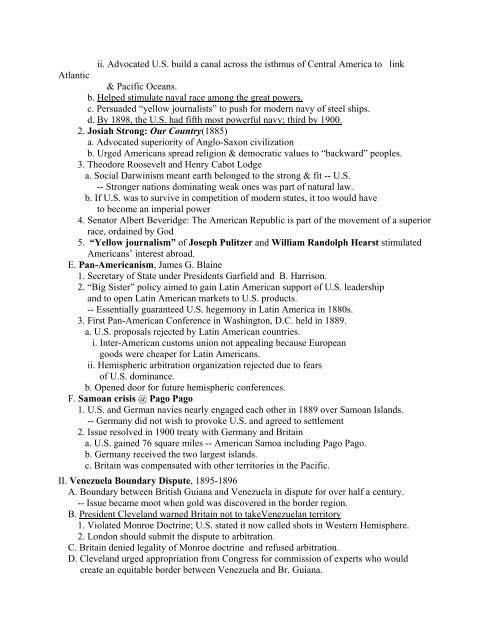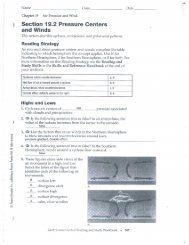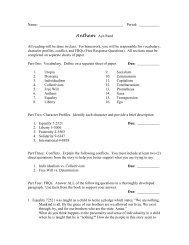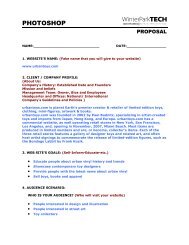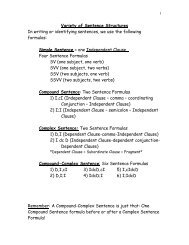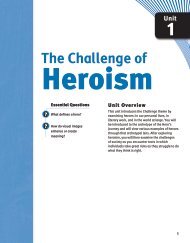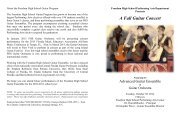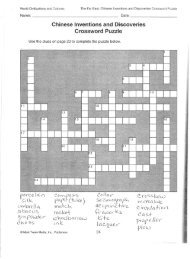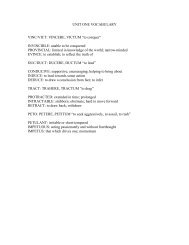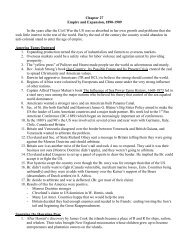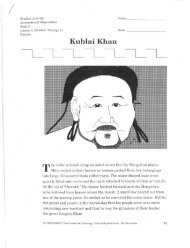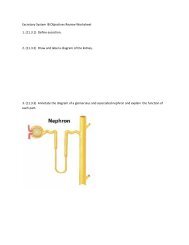Imperialism Notes 1890-1913
Imperialism Notes 1890-1913
Imperialism Notes 1890-1913
Create successful ePaper yourself
Turn your PDF publications into a flip-book with our unique Google optimized e-Paper software.
ii. Advocated U.S. build a canal across the isthmus of Central America to link<br />
Atlantic<br />
& Pacific Oceans.<br />
b. Helped stimulate naval race among the great powers.<br />
c. Persuaded “yellow journalists” to push for modern navy of steel ships.<br />
d. By 1898, the U.S. had fifth most powerful navy; third by 1900.<br />
2. Josiah Strong: Our Country(1885)<br />
a. Advocated superiority of Anglo-Saxon civilization<br />
b. Urged Americans spread religion & democratic values to “backward” peoples.<br />
3. Theodore Roosevelt and Henry Cabot Lodge<br />
a. Social Darwinism meant earth belonged to the strong & fit -- U.S.<br />
-- Stronger nations dominating weak ones was part of natural law.<br />
b. If U.S. was to survive in competition of modern states, it too would have<br />
to become an imperial power<br />
4. Senator Albert Beveridge: The American Republic is part of the movement of a superior<br />
race, ordained by God<br />
5. “Yellow journalism” of Joseph Pulitzer and William Randolph Hearst stimulated<br />
Americans’ interest abroad.<br />
E. Pan-Americanism, James G. Blaine<br />
1. Secretary of State under Presidents Garfield and B. Harrison.<br />
2. “Big Sister” policy aimed to gain Latin American support of U.S. leadership<br />
and to open Latin American markets to U.S. products.<br />
-- Essentially guaranteed U.S. hegemony in Latin America in 1880s.<br />
3. First Pan-American Conference in Washington, D.C. held in 1889.<br />
a. U.S. proposals rejected by Latin American countries.<br />
i. Inter-American customs union not appealing because European<br />
goods were cheaper for Latin Americans.<br />
ii. Hemispheric arbitration organization rejected due to fears<br />
of U.S. dominance.<br />
b. Opened door for future hemispheric conferences.<br />
F. Samoan crisis @ Pago Pago<br />
1. U.S. and German navies nearly engaged each other in 1889 over Samoan Islands.<br />
-- Germany did not wish to provoke U.S. and agreed to settlement<br />
2. Issue resolved in 1900 treaty with Germany and Britain<br />
a. U.S. gained 76 square miles -- American Samoa including Pago Pago.<br />
b. Germany received the two largest islands.<br />
c. Britain was compensated with other territories in the Pacific.<br />
II. Venezuela Boundary Dispute, 1895-1896<br />
A. Boundary between British Guiana and Venezuela in dispute for over half a century.<br />
-- Issue became moot when gold was discovered in the border region.<br />
B. President Cleveland warned Britain not to takeVenezuelan territory<br />
1. Violated Monroe Doctrine; U.S. stated it now called shots in Western Hemisphere.<br />
2. London should submit the dispute to arbitration.<br />
C. Britain denied legality of Monroe doctrine and refused arbitration.<br />
D. Cleveland urged appropriation from Congress for commission of experts who would<br />
create an equitable border between Venezuela and Br. Guiana.


